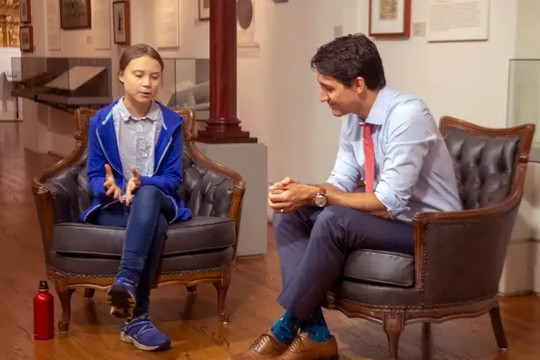Climate activist Greta Thunberg & Canadian Prime Minister Justin Trudeau.
Canadian leadership cares more about the ‘environment’ than a ‘war’. Prime Minister Justin Trudeau has told NATO officials privately that Canada will never meet the military alliance’s defense-spending target, according to a leaked secret Pentagon assessment obtained by The Washington Post. The document’s anonymous authors say Canada’s “widespread” military deficiencies are harming ties with security partners and allies.
The document, which has not been previously reported on, says “enduring” defense shortfalls led the Canadian Armed Forces to assess in February that it “could not conduct a major operation while simultaneously maintaining its NATO battle group leadership [in Latvia] and aid to Ukraine” — and that the situation was not “likely” to change without a shift in public opinion.
The United States and Canada, neighbors and close NATO allies, share responsibility for defending the continent as partners in the North American Aerospace Defense Command, or NORAD. Washington has long pressed Ottawa to boost its spending on defense and hasten plans to upgrade military capabilities and infrastructure in the Arctic, where officials of both countries warn that Russia and China are being more assertive.
The document, part of a trove of classified material leaked to the Discord messaging app, allegedly by a member of the Massachusetts Air National Guard, offers new insight into dissatisfaction and concern in the United States and beyond about Canadian defense policy and priorities.
“Widespread defense shortfalls hinder Canadian capabilities,” the document says, “while straining partner relationships and alliance contributions.”
The assessment, which bears the seal of the U.S. Joint Chiefs of Staff, says Germany is concerned about whether the Canadian Armed Forces can continue to aid Ukraine while meeting its NATO pledges. Turkey is “disappointed” by the Canadian military’s “refusal” to support the transport of humanitarian aid after February’s deadly earthquake there, the document says, and Haiti is “frustrated” by Ottawa’s reluctance to lead a multinational security mission to that crisis-racked nation.
Trudeau, asked whether he made the comments the document alleges, did not respond directly. “I continue to say and will always say that Canada is a reliable partner to NATO, a reliable partner around the world,” he told reporters in Ottawa. He said his government would ensure that the Canadian Armed Forces has the tools it needs.
Since February 2022, Canada has provided Ukraine more than $1 billion of military aid, including armored vehicles, ammunition, a surface-to-air missile system that it sourced from the United States, and eight German-made Leopard II tanks that it transferred to Poland for delivery to Ukraine. The Canadian Armed Forces has trained more than 36,000 Ukrainian military and security personnel since 2015 and leads a NATO battle group in Latvia.
But some NATO members are “concerned” that Canada has not increased the number of personnel deployed to Latvia, the document states, despite a pledge last year to do so. NORAD finds that the Canadian Armed Forces lacks “significant Arctic capabilities, and modernization plans have not materialized despite multiple public statements.”
Kerry Buck, a former Canadian ambassador to NATO, said Canada has long relied on the United States to be its security umbrella. She said Canadian diplomats and defense officials “are fully aware” of the impact that shortfalls have “on Canada’s international reputation and our reputation with our U.S. partners.”
“Whether that translates into government-wide action is a different question with a different answer,” Buck told. “There has been underinvestment in defense and broader security for quite a while now in Canada, from my perspective, and through successive governments.”
In an open letter the Canada-based Conference of Defense Associations Institute called on Ottawa to “radically accelerate the timelines for procurement and redress the poor state of our nation’s current defense capacity, capabilities and state of readiness.” “Years of restraint, cost cutting, downsizing and deferred investment have meant that Canada’s defense capabilities have atrophied,” said 60 signatories, who included several former Canadian defense ministers, military commanders, and security and intelligence officials.
According to NATO, Canada spends an estimated 1.29 percent of its economic output on defense — well short of the 2 percent guideline that members agreed in 2014 they would aim to meet. In the midst of the war in Ukraine, which has mobilized Western allies, NATO Secretary General Jens Stoltenberg said recently that a growing number of countries view the benchmark “as the floor, not the ceiling.”
Privately, the document says, he has “told NATO officials that Canada will never reach 2% defense spending.” It notes that the military budget has been below 1.4 percent of gross domestic product for 26 years.
It says nearly all of Canada’s 78 Leopard II tanks “require extensive maintenance and lack spare parts.” In one unit, only nine of 40 are fully or partly operational. The assessment says the military lacks half the pilots it requires, and calls procurement decisions “politically motivated, constrained by limited staffing and not properly codified in budget items.”
Gen. Wayne Eyre, Canada’s chief of the Defense Staff — the equivalent of the chairman of the U.S. Joint Chiefs of Staff — has acknowledged problems in recruitment, retention and readiness. The government last year announced a review of defense policy. Critics say it must be sped up.
In October, Eyre ordered a halt to nonessential activities so commanders could focus on personnel shortages. One factor fueling the shortages, officials acknowledged, is a string of sexual misconduct allegations against top leaders. A government-commissioned report said the crisis “has caused as much damage as defeat in combat would have to demoralize the troops and shock Canadians.”
read more in our Telegram-channel https://t.me/The_International_Affairs

 10:03 25.04.2023 •
10:03 25.04.2023 •























